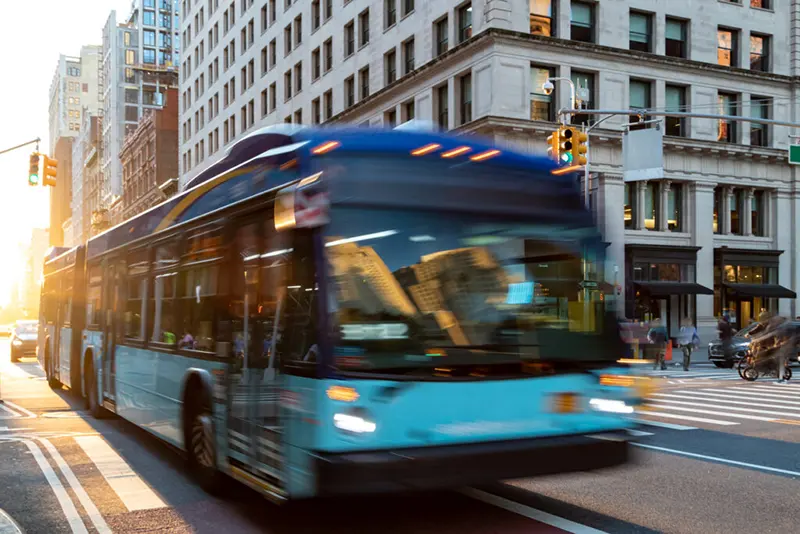Table of Contents
Accidents involving buses can be legally complex because of the number of injured people on the bus, other vehicles and injuries involved, and the municipality in which the accident occurred. These accidents require experienced Fort Lauderdale personal injury lawyers who have worked on many bus accident cases to recover damages.
To learn if there is potential for filing a lawsuit for damages, take advantage of a free consultation with Kogan & DiSalvo. An experienced injury lawyer will evaluate the circumstances of the accident and explain Florida’s applicable laws, the legal steps involved, and the exacting processes required by the courts.

Broward County bus accidents are caused either by a driving mistake, mechanical issues with the bus, or another vehicle sharing the road with the bus. Bus drivers involved in crashes can be distracted by traffic, passengers and road conditions, or because they are unfamiliar with the roadway. Worse, crashes may occur if the bus driver is impaired from alcohol or drug ingestion, or just fatigue. Psychological ills, stress or lack of proper training can also be factors that erode a bus driver’s alertness, judgment, and general performance on the road.
Some bus collisions are caused not by driver error but by poor maintenance that fails to catch worn-out parts. The bus owner can fail to perform general maintenance, which can lead to failures of the steering, braking, fuel delivery or suspension systems. Allowing buses to go on the road with badly worn tires can also result in a crash. Because buses are generally so heavily used, regular maintenance checkups may sometimes get delayed until a slower period of demand or a less busy season.
To accurately identify the cause of an accident and which party should be held accountable, Fort Lauderdale bus accident lawyers will investigate a bus company’s maintenance and repair records and hiring practices. This can include reviewing log books and driver training procedures and conducting background checks on drivers. In complex accident cases, the attorney may retain an accident reconstruction specialist to help develop evidence.
Even when bus drivers are vetted by their employers, properly trained, and fully prepared to work at peak performance, bad weather conditions, hazardous roads, inadequate signage, and the negligence of other drivers can cause them to get into accidents that endanger the lives of their passengers.
Most buses are not equipped with safety belts or other restraint systems, making it easier for passengers to be thrown around in a collision, particularly if they are standing at the time of the crash. The speed at which the bus was moving, weather conditions, what it collided with, the force of impact and what positions different passengers were in when the crash occurred can all determine how serious or minor the injuries that result are: Among the most severe injuries, which require extensive medical treatment, are:

Whether or not you are awarded damages in a personal injury lawsuit typically depends on the strength of the evidence you are able to present. You need to prove that the bus driver was at fault for the accident you were injured in and that your injuries are directly tied to the crash. The actions you take immediately after a collision can determine whether or not you are awarded compensation or not.
The top priority after an accident is to seek medical attention at a hospital emergency room or an urgent care center. The medical assessment that you receive following an accident will help to show that your injuries are related to the crash. You should also call 911 to report the accident so there will be an official record. This is particularly critical if the police don’t arrive at the accident scene in a timely manner to survey the damage. If you are able to speak to the police, be careful about what you say in order to avoid incriminating yourself.
If you are not in too much pain and can spare a few minutes before going for medical treatment, take photographs of the accident scene, including any relevant signage that the bus driver may have ignored. Ask your fellow passengers on the bus for their contact information so that you can stay in touch and compare notes about your medical assessments.
Injuries aren’t always apparent right after the accident has occurred. It may sometimes take up to a week for you to be aware of pain that you didn’t have before the accident. It will be harder for the bus driver’s or bus company’s attorneys to argue that your injuries are not the result of the accident if you and your lawyer have collected corroborating stories of similar injuries from other people involved in the crash.
The data from any onboard electronic recording devices that are required to be installed on public vehicles by the Federal Motor Carrier Safety Administration may also help to support your account of the accident and your injury claims.
If you are injured in a vehicular accident in Florida, including those involving a bus, you generally have two years from the date of the accident to file a claim. Not only is a court likely to dismiss your case if you have missed this deadline, but the longer you wait before filing a claim the more difficult it will probably be to collect the evidence you need to win your case.
Negligence is defined under the law as failure to use care toward other individuals or the public as a whole.
Bus accidents are adjudicated under Florida’s Comparable Negligence statute, which places fault for causing the accident and reduces damages awarded by whatever percentage the claimant is found to have been at fault for the accident, if any. The percentage is determined by a jury or judge based on the evidence presented in court.
A Fort Lauderdale bus accident lawyer must prove all five elements outlined by negligence law in order to win a case and get his client the compensation they deserve for their injuries:

Damages are designed to pay for the medical and other costs incurred by the injured person. However, if the lawsuit seeks damages from a local or state government authority in Florida, such as a city bus line, the doctrine of “sovereign immunity” applies, which limits the damages the government agency is required to pay to accident victims under Title XLV, section 768.28, of the Florida Statutes.
A government agency has to allow itself to be sued by a third party, and in Broward County the maximum damages allowed to one claimant are $200,000. When there are multiple claimants suing a government agency for injuries caused by the same incident, total damages are capped at $300,000. This statute was famously challenged in lawsuits against the Broward County public school district after 19 students and teachers were killed by a lone gunman at Marjory Stoneman Douglas High School in 2018. Victims and their families ultimately were awarded $26 million in damages in December 2021.
Broward County and the rest of South Florida are home to thriving metropolitan centers as well as tourist attractions. It is common to see the busy streets of Fort Lauderdale and surrounding areas bustling with city buses, school buses, and tour buses at most times of the day. While less prevalent than car collisions, bus accidents do occur and often result in injuries and even fatalities for some passengers.
Suing a bus driver for an accident you were injured in requires that you prove the accident was caused by the bus driver’s negligence. In most cases, the bus driver will have been employed by a private company or a government authority when the accident occurred, in which case the bus driver’s employer, whether a company or government entity, can be held responsible to pay compensation for your injuries instead of the driver.
Lawsuits related to accidents involving a city bus can be more complex because then the city itself can be liable for damages that must be paid to claimants. Under Title XLV, section 768.28, of the Florida Statutes, neither the state nor its subdivisions are liable in tort cases for acts or omissions of a state employee or agent committed outside the course or scope of their employment or committed in bad faith or with malicious purpose, showing disregard for human rights or safety. But sovereign immunity is waived in lawsuits arising from personal injuries resulting from negligence found to have been committed by government employees while carrying out their government-assigned duties, including municipal bus drivers. In Florida, however, the sovereign immunity waiver precludes claimants from being awarded punitive damages or interest for the period before a judgment.
Sovereign immunity waivers also apply to personal injury cases arising from a government employee’s negligence related to maintaining the vehicle in safe and optimal operating condition.
When the accident involves a tour bus, the tour company that hired the bus may be liable. As part of its Duty of Care, a tour company must ensure that the bus company it hires to transport its customers has a clean record when it comes to safety violations, collisions, and maintenance checks. If a tour bus is involved in an accident, another party that could potentially be liable is the owner or operator of any facility where the tour bus stopped to let passengers off if one or more passengers got injured de-boarding because of hazardous conditions at the facility.

Although bus accidents may be less common than car accidents in the United States, they have been occurring with greater frequency in recent years and have resulted in higher numbers of injuries and fatalities, according to the FMCSA. Unfortunately, statistics available from the FMCSA do not make it easy to know precise numbers because bus crash-related injuries and deaths are combined with those for large trucks.
The number of persons injured in a bus crash declined in fits and starts from 36,000 in 1999 to 23,000 in 2012 before spiking to 38,000 in 2013 nationwide. Between 2014 and 2019, the number of bus injuries dropped again, hovering between 22,000 and 27,000 except for a jump to 35,000 in 2016. Although still high, it is somewhat encouraging that the overall number of bus crash injuries declined over this 20-year time span even as the number of buses registered across the U.S. increased by 36 percent from 728,777 in 1999 to 992,152 in 2019.
Unfortunately, it’s harder to know precise numbers of fatalities in bus crashes during the same period because data for bus crashes are combined with data for large truck crashes. In 2019, 5,237 large trucks and buses were involved in fatal crashes, up 2 percent from 2018. From 2018 to 2019, large truck and bus fatalities per 100 million vehicle miles traveled by all motor vehicles declined from 0.162 to 0.161, 21 percent below the to-date 21st century peak of 0.205 in 2000.
If you or a loved one have been involved in any type of bus accident, then do not hesitate to contact Fort Lauderdale bus accident attorneys at Kogan & DiSalvo who can fight for your right to compensation. Passengers on a bus involved in a crash, the driver and passengers of another vehicle that collides with a bus, and pedestrians hit by a bus may be entitled to receive compensationfor whatever pain, suffering and expenses have resulted from their injuries.
If your loved one died as a result of injuries sustained in a bus accident, you can file a wrongful death lawsuit against the parties responsible for the crash. But going up against a bus company or a municipal or state authority, or the insurance provider of either one, is certain to be challenging, especially if you are still in pain from your injuries and not operating at your full capacity mentally or physically. Having one of our bus accident lawyers in Fort Lauderdale beside you to guide you through each step of the legal process will relieve any worries you may have.
The bus accident lawyers at Kogan & DiSalvo have been applying their resources and know-how to help motor vehicle accident victims in South Florida navigate the lawsuit process for many years and helping them win the damages they’re entitled to. You have nothing to lose and everything to gain by calling for a free consultation with one of our lawyers to learn what your options are.
If you are injured and unable to come to us,
our attorney will come to you - there is no charge for us to do so.